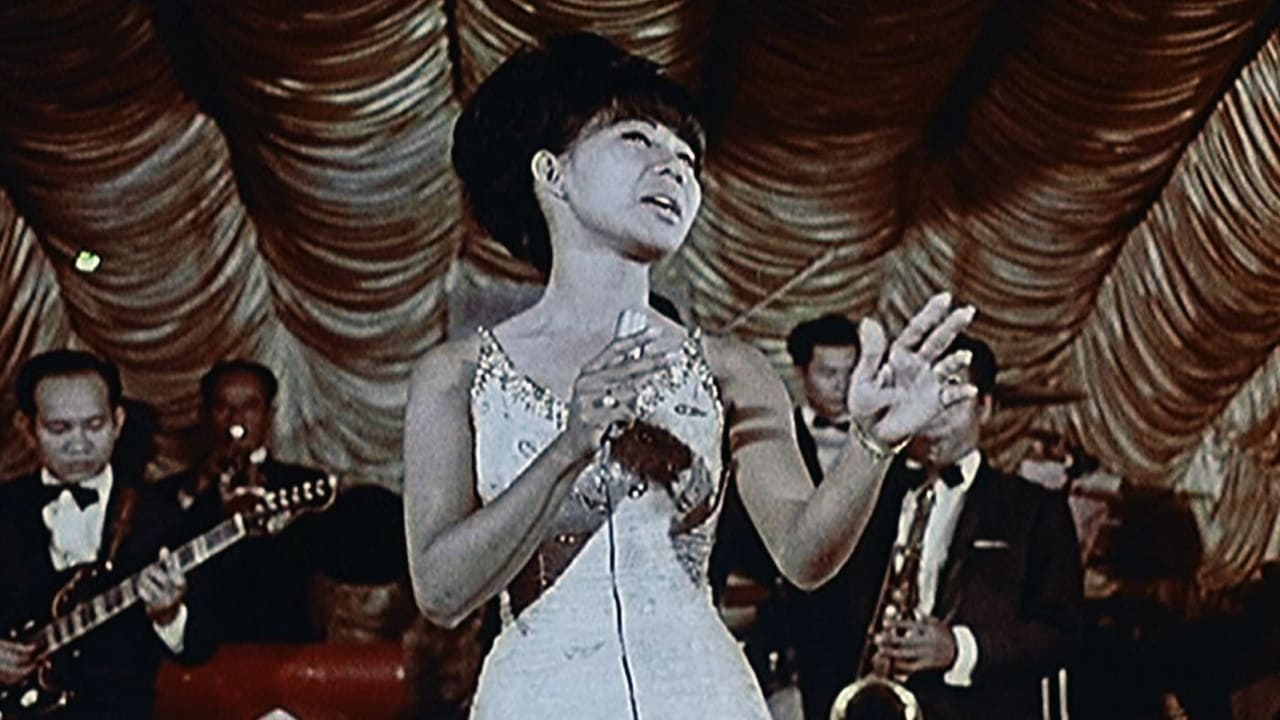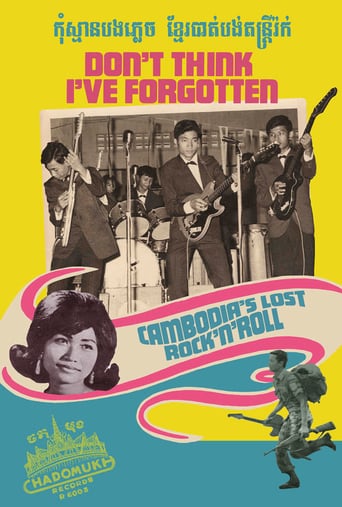Ketrivie
It isn't all that great, actually. Really cheesy and very predicable of how certain scenes are gonna turn play out. However, I guess that's the charm of it all, because I would consider this one of my guilty pleasures.
Voxitype
Good films always raise compelling questions, whether the format is fiction or documentary fact.
FirstWitch
A movie that not only functions as a solid scarefest but a razor-sharp satire.
Griff Lees
Very good movie overall, highly recommended. Most of the negative reviews don't have any merit and are all pollitically based. Give this movie a chance at least, and it might give you a different perspective.
Scott44
***Recommend coolyaron10's remarks. ("A fascinating insight into an obscure history", coolyaron10, 12 January 2014).***"Don't Think I've Forgotten: Cambodia's Lost Rock and Roll (2014, John Pirozzi)," a documentary showing a country's descent into barbarism, is very moving. Essential viewing, it should have been recognized by the 85th Academy Awards?. Cambodia's transition from a modernizing Eastern country being energized by Western pop culture to a worse place than Hell should be remembered, particularly in the country which is responsible for so much of the destruction.Nine years in the making, "Forotten" describes how Cambodia's independence from France in 1953 led to the King Norodom Sihanouk era. Sihanouk comes off here as a benevolent dictator. Himself a singer and from a family with a passion for the arts, Sihanouk's culturally progressive but politically repressive regime was in contradiction. Sihanouk managed to keep Cambodia neutral for years, keeping a low profile during the conflicts between the Eastern powers and the US. (For a detailed examination of Cambodia, I recommend the writing of Noam Chomsky? and Edward S. Herman?. Chomsky and Herman argue that the US deliberately bombed Cambodia to the Stone Age in order to create the conditions for the Khmer Rouge to form. The idea that the architects of the war were trying to create a monster like Pol Pot is seldom expressed in public even today. While "Forgotten" does not spell everything out, it shows US bombers dropping their payload. Many flag-waving Americans believe July Fourth is not an appropriate day for this conversation. My personal belief is that criticism of the US military's propensity to bomb the crap out of small nations is one of the more patriotic ways to mark Independence Day.)Much of the film's running time focuses on the beautiful music between 1953 and 1975. Cambodia embraced Cuban jazz, pre-Beatles pop stars, the Rolling Stones and later, Santana. (What about the Beatles?) Often the Cambodian rockers lifted the western songs completely, adding Khmer lyrics to them. Other times, they produced sublime ballads featuring duets between leading male and female singers. The fresh and strange quality this music brings to Western ears is one of the great delights of this film.The leading musical figure was Sin Sisamuth?, who remained at the top throughout the period in question. Sisamouth achieved national standing with exquisitely presented ballads, some of which he wrote. As Western music changed in the 1960s, so did Sisamouth; he was experimenting with jazz and garage rock when not singing duets with lovely Cambodian singers. We hear fragments of the duets. Sisamouth paired with the enchanting Ros Sereysothea? is of particularly high quality, and must be heard to be believed.The people who are interviewed represent a variety of economic stations. All of them, including two US officials, seem to be burdened with the memory of "The Killing Fields" (as the Khmer Rouge's bloody reign is often called). This is a small spoiler, but the film concludes with Phnom Penh? today. Life goes on, and hopefully the future there will know great culture without authoritarian backlash."Don't Think I've Forgotten: Cambodia's Lost Rock and Roll," is a vital, mesmerizing documentary.
coolyaron10
This is one of those movies that leaves you at a loss for words. Don't Think I've Forgotten: Cambodia's Lost Rock and Roll tells the story of Rock and Roll in Cambodia. It details how, in the 1960's and early 70's, rock music in the west and traditional Khmer music came together to form a unique sound which is found nowhere else. The music in the movie is absolutely fantastic, and is not only unique, but it actually sounds good, even if you don't understand a word of the lyrics. And to add to this, it interviews all sorts of people about music in Cambodia; surviving musicians, family and friends of artists, music fans, vinyl collectors, historians, even a prince. Then, it touches delicately on the history of the Khmer Rouge and Vietnam War, and while this touch is not detailed it tells the history in a way that will educate you without taking away from the main focus. It is clear, though, that this movie was not an easy one to make. After talking to the director and producer himself, John Pirozzi, I discovered that this movie took a whopping nine years to complete, and was only finished several weeks before the world premiere. But the main thing that this movie does is showcase something hard to find. Most Americans associate Cambodia only with the Vietnam War. There is no movie that can give you the information in this movie, in fact, there are few websites that could give you a mere fraction of the information in this movie. There is simply no place to go where you can learn about these artists and their lives, and there are only limited recordings of them on the web. And that, I feel, is the most compelling reason to watch this movie. There simply isn't any alternative.

